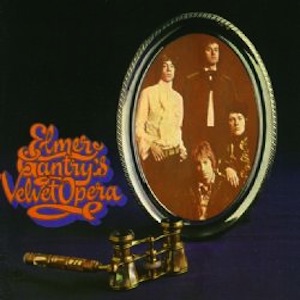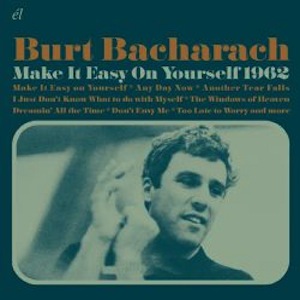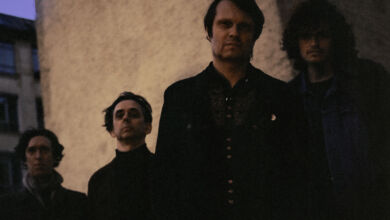
Elmer Gantry’s Velvet Opera
Elmer Gantry’s Velvet Opera (Grapefruit Records CRSE6026)
Those of you with time on your hands have undoubtedly played the game at some point. Why do some bands make it, and some don’t? The question may be well asked about Elmer Gantry’s Velvet Opera, a talented late 60’s combo working the popular end of psychedelia, providing tuneful, accessible sounds, supporting such luminaries as John Mayall’s Bluesbreakers and Pink Floyd. The reason, I’ll leave to you and yours to sort out, I’m cocking an ear at this much revered LP, newly re-released by those lovely folk at Grapefruit Records.
A refreshing change to the wittering, wig-outs and sheer foolishness that is apt to turn up on LPs of this vintage, ‘EGVO’ lives up to its grandiose name without shovelling on the heavy riffing, lengthy guitar nonsense or diving into a vortex of queasy effects. Instead, concentrating on assured tunesmithing, bright vocals and light, supporting harmonies, the band turn in an LP which will definitely bear up to repeated listening.
With a drawl that slips somewhere between a Mid West snake-oil salesman and Andrew Sachs of ‘The Good Old Days’, the opening track, ‘Intro’, closely followed by ‘Mother Writes’, are little bits of whimsy to ease the listener into a place that could only be England, late 60’s, with its touches of homely kitchen sink drama and everyday conversation.
Piping calliope sounds accompany the cheekily titled ‘Mary Jane’, earning it a ban (yawn) from the BBC for alluding to some exotic smoking mixture, even though the song could be read as a plain, simple love song in anyone’s language.
‘I Was Cool’ is a comical little ditty comedy with a creeping beat, led by a very English take on a Screamin’ Jay Hawkins voice. Exploring their musical hall aspect still further, with the help of some loose bass and guitar over a spy movie style theme, is ‘Walter Sly meets Bill Bailey’.
‘Air’ glides along on some beautiful, soaring sitars and tabla rhythms, which perfectly illustrate a sense of peace, rather than, as some practitioners of the hippie arts do, obscure it, or worse, propel it into some tedious freak-out.
We’re back in whimsy country with ‘Looking for a Happy Life’, a joyous vocal/harmony led song that is as accessible as it is well crafted. ‘Flames’ starts with a hard, driving rhythm reminiscent of Steppenwolf, a fine, tight workout that doubtlessly did good service in the live arena where ‘EGVO’ flourished.
‘What’s The Point of Leaving’ takes up back to our comfort zone, a languorous piece that evokes The Idle Race at their best. ‘Long Nights of Summer’, an irresistible piece in the ‘Dear Prudence’ vein, is guaranteed to warm the hearts of even the most hard bitten of cynics.
‘Dream Starts’ makes surprisingly good use of a rasping vibrato in this Syd-era Floyd-a-like descending pattern, punctuated with horns and a drum tattoo that will make you believe you’ve woken up in Portmeirion Village, but of your own volition. ‘Reflections of a Young Man’ is a nervous piece, a kiss off / love letter to an older woman who makes a habit of leading young men astray.
‘Now She’s Gone’ is a finely wrought string and harmony-assisted take on love and loss that never wallows in any useless self-pity.
As an LP, these cogent twelve tracks are refreshingly free of the excesses that often characterises music of this period, they rarely breach the three minute barrier, and I would have been happy with them alone. This being a caring record company, you get more. The single version of ‘Flames’ is upfront and alert, but perhaps lacks a punchiness that could have propelled it into the already quality laden charts of the late 60’s. ‘Salisbury Plain’, another single, is a moody, mercurial piece, enjoyably experimental without getting bogged down, but the public once more gave an unfavourable verdict.
‘Mary Jane’ benefits from some sweet echo, being tighter than the LP version, and has ‘hit’ written all over it-except in the singles chart, that is. When you consider some of the highly suggestive material that some well-established bands were getting away with in this period, you do begin to wonder what the BBC was thinking of banning this lovely, harmonious slice of psychedelia.
‘Dreamy’, another piece of English flutter-bye pop sounds a little forced, suggestive of a band running out of ideas, but the production is up to the usual standard, and saves it.
‘Volcano’ is a sign that desperation may have set in, its crashing beat many miles away from the sweetness and light of their regular output.
‘A Quick B’ with its urgent guitars and honking harmonium, and those circus trick drums is an enjoyable enough burst of bluesy energy, putting you in mind of ‘Boom Boom Boom Boom’, but lacking a certain ambition.
‘Talk of the Devil’ takes us into the more risky territory of echoey guitar, hissing, thumping drums and hesitant, half threatening vocals, alternately bawling or whispering out their warning as circumstances dictate.
OK, these and the remaining four tracks are filler, but some bands release it as an anthology and charge full ticket for it. Make a little room in your life for this little slice of finely crafted, late 60’s psychedelia. BUY HERE!
Burt Bacharach
Make It Easy On Yourself 1962: Burt Bacharach (El Records ACMEM258CD)
‘Best of’s can delight the casual buyer, but the hardcore collector is a more difficult beast to please. However, here’s one that might just confound his low expectations. Basically, a collection of the work of one year in the staggeringly successful career of Burt Bacharach, it will amaze even Burt-watchers with its attention to detail.
Jerry Butler’s version of the title track is hugely creditable, his sonorous voice perfectly expressing this emotional work to the non- more-lush string arrangement that would make Burt’s name one of the biggest in the music industry within a very short time.
In amongst the US based artists, British crooner Jack Jones puts in two impressive performances here, in ‘Dreamin’ All The Time’ and ‘Pick Up The Pieces’ evidence that he was far more versatile than is given credit for.
Tommy Hunt ‘s excellent treatment of ‘I Just Don’t Know What To Do With Myself’, with its soaring, dramatic arrangement by Burt, is one of the CD’s standouts, and is followed by his effortlessly measured ‘Don’t Make Me Over’, an emotional plea both arranged and produced by Burt.
The contrasting versions of ‘Waiting For Charlie To come Home’ have a ‘spot the difference’ backing, but the cool vocals of Jane Morgan are no match for the ballsy rasp of Etta James, and it’s Etta’s version I warm to, I am confessing to complete bias there.
Pitching Chuck Jackson’s performance of the beautiful ballad, ‘Any Day Now’ immediately before Dee Dee Sharp’s own version is a pleasant, understated contrast. ‘Feelin’ No Pain’ is a jaunty, rollicking piece that even Guy Mitchell might have drawn the line at, but Paul Evans’ bright rendition elevates it way above complete hokum.
There are many other welcome appearances within the 25 tracks on offer here, notably Timi Yuro’s ‘The Love of a Boy’, the CD closing with Marlene Dietrich’s ‘Sag Mir Wo Die Blumen Sind’(‘Where Have All The Flowers Gone?’). You know you’re famous when Marlene Dietrich writes your liner notes. BUY HERE!
Bill Nelson
Getting The Holy Ghost Across- Bill Nelson (Cherry Red COCD 21009)
Walking a thin line between 80’s heroic bluster and a lightened-up prog-rock sensibility, Bill Nelson’s 1986 LP ‘Getting the Holy Ghost Across’ has rightly been given the full re-master CD treatment, and comes with a great bonus CD of goodies to boot.
An LP written, as Bill explains in the copious sleeves notes, at a time of deep personal turmoil, it nevertheless contains some of his most accessible work. Reflecting the then-fashionable roaring boy vocals and polyrhythms which pervaded that confused musical decade, Bill nods to the recent past throughout the LP, unafraid to use some stylings that hark back to the early 70’s, but omitting that decade’s worst noodling excesses.
Beginning with ‘Suvasini’, with its ‘Wish You Were Here’ feel of languorous guitar, melting into the Eastern styling of ‘Contemplation’ with wailing keyboards, percussion and a mystical love lyric makes for an excellent start.
The peace doesn’t last long, as wow and flutter wake us up in ‘Theology’, an off-kilter meditation on love and enlightenment over a soundtrack of the kind of metal-bashing that became an 80’s trope in its own right. ‘Wildest Dreams’ also utilises this curious style, but with sophisticated sax and falsetto vocal to keep it out of heavy metal territory. Basically a re-imagining of the classic material that had been ably covered by others in the mid 1970’s, this track goes way beyond mere pastiche.
‘Lost in Your Mystery’ re-visits the classic song writing canon for inspiration, this time coming up with an Oriental feel to a song of guilt and recrimination and the end of an affair. ‘Lost in Your Mystery’ s electric piano opening seems to propel us to the same, mid-Century place, but soon soars into a spell rich in occult symbolism, bell-like synths and guitars spiralling ever upward.
‘Age of Reason’ takes us back to more accessible 80’s territory, all fanfares, thumping drums and Bill’s upbeat vocal belying one of the LP’s deeper lyrics. Followed by a freer melody, with an Oriental styling to the vocal backing and rhythm section, ‘The Hidden Flame’ was surely single material, but was puzzlingly not used as such.
‘Because of You’ is heavy on those electronic drums, funk rhythms and screaming bluesy guitars but Bill’s voice is firmly in the 80’s, a lyric best encapsulated in the line’ Nailed to the Cross of Love’. Close your eyes, and you’re in a glass and chrome nightclub sometime in the 80’s, ordering a Brandy Alexander as news of the Stock Market’s Big Bang comes out over the giant TV screens. The gentle guitar stroking of ‘Pansophia’ leads us out into a much less fraught place.
The 12-inch version of ‘Wildest Dreams’ heads up the second disc, with further gems from Bill’s ‘Living for the Spangled Moment’ EP, a more loose, fragmented feel to many of the entries. ‘Illusions of You’ deserves special mention for its hint of township jive, here working purely as an original backing, rather than the dubious use it was often put to by others in the music industry.
That this LP caused a certain amount of apoplexy with the US based record label may come as a surprise to the reader. Instead of picking up on the sophisticated radio friendly styling of the music, which the USA had gone ape for when Mr Bowie produced an LP worth of it, the label bosses instead saw red about Bill’s use of occult symbolism and so the LP was hastily retitled ‘On A Blue Wing’, with some obscure artwork on the cover, replacing the sublime image of Crivellis’ ‘Anunciation of St Emidius’ which adorned the UK cover. BUY HERE!











